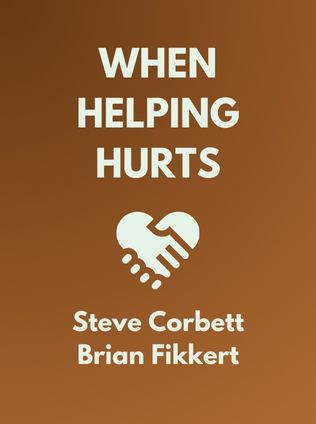
When Helping Hurts
How to Alleviate Poverty without Hurting the Poor...and Yourself
By Steve Corbett and Brian Fikkert
Published 06/2009
About the Author
Steve Corbett and Brian Fikkert are distinguished figures in the field of poverty alleviation and Christian missions. Corbett and Fikkert have a profound understanding of the complexities surrounding poverty, particularly from a Christian perspective. They are both associated with the Chalmers Center for Economic Development, where their work focuses on empowering individuals and communities to break free from the cycles of poverty. Their book, When Helping Hurts, has become a significant resource for individuals and organizations involved in missions and poverty alleviation, particularly within the Christian community.
Corbett and Fikkert's approach to poverty is deeply influenced by their Christian faith, which sees poverty not just as a lack of material resources but as a complex web of broken relationships—between individuals and God, among people, and within communities. Their insights are drawn from years of experience in the field, working with various organizations and communities, both domestically and internationally. Their expertise is not only academic but also deeply practical, making their advice particularly relevant for those involved in ministry work and community development.
Main Idea
The central thesis of When Helping Hurts is that poverty alleviation efforts often do more harm than good when they are conducted without a proper understanding of the root causes of poverty. Corbett and Fikkert argue that poverty is not merely a lack of material wealth, but a more profound sense of powerlessness and brokenness that stems from damaged relationships with God, self, others, and the rest of creation. Therefore, effective poverty alleviation must go beyond providing material resources; it must also address these deeper relational issues.
The authors emphasize the importance of a humble approach to helping others—one that recognizes the dignity and agency of those in poverty. They warn against paternalism, where well-meaning individuals or organizations impose solutions on the poor without considering their perspective or involving them in the process. Instead, Corbett and Fikkert advocate for an approach that empowers the poor, enabling them to take charge of their own development.
Ultimately, the book challenges readers to rethink their assumptions about poverty and to adopt strategies that genuinely help rather than hurt those they seek to assist. It calls for a shift from relief-based aid to long-term development strategies that are rooted in relationships and community involvement.
Table of Contents
- Introduction: Why the Way We Help the Poor Matters
- Chapter 1: What is Poverty Really?
- Chapter 2: The God Complex
- Chapter 3: Avoiding Harm in Short-Term Missions
- Chapter 4: The Three Key Principles of Poverty Alleviation
- Chapter 5: Understanding the Difference Between Relief, Rehabilitation, and Development
- Chapter 6: The Role of the Church in Poverty Alleviation
- Chapter 7: Empowerment and Sustainability
- Chapter 8: Measuring Success in Poverty Alleviation
- Chapter 9: Moving Forward: Practical Steps for Implementing Change
- Conclusion: The Call to Humility and Relationship
Introduction: Why the Way We Help the Poor Matters
In the introduction, Corbett and Fikkert set the stage by explaining the importance of understanding how our efforts to help the poor can sometimes backfire. They argue that well-intentioned but misguided efforts can reinforce the very problems they seek to solve. The introduction invites readers to embark on a journey of rethinking traditional approaches to poverty alleviation, emphasizing the need for humility, understanding, and a willingness to learn from those we seek to help.
"Good intentions are not enough. It's essential to understand that our attempts to help can sometimes make the situation worse if we don't approach poverty alleviation with the right mindset and strategies." — Corbett and Fikkert
Chapter 1: What is Poverty Really?
This chapter challenges the conventional understanding of poverty. Corbett and Fikkert argue that poverty is not simply the absence of material wealth but a state of broken relationships. They draw on extensive research to show that the poor often describe their situation in terms of shame, powerlessness, and a sense of inferiority rather than just a lack of resources.
"Poverty is the result of broken relationships with God, self, others, and the rest of creation. When these relationships are broken, it leads to a profound sense of powerlessness and shame." — Corbett and Fikkert
To help the reader understand this concept, consider the following examples:
Sign up for FREE and get access to 1,400+ books summaries.
You May Also Like
The Subtle Art of Not Giving a F*ck
A Counterintuitive Approach to Living a Good Life
By Mark MansonRich Dad Poor Dad
What the Rich Teach Their Kids About Money - That the Poor and Middle Class Do Not!
By Robert T. KiyosakiHow To Win Friends and Influence People
The All-Time Classic Manual Of People Skills
By Dale CarnegieFreakonomics
A Rogue Economist Explores the Hidden Side of Everything
By Steven D. Levitt and Stephen J. Dubner



















